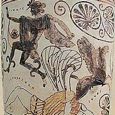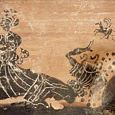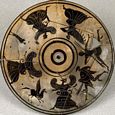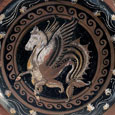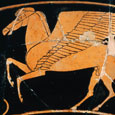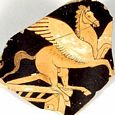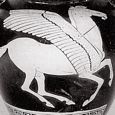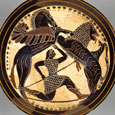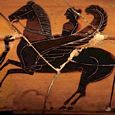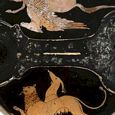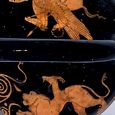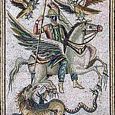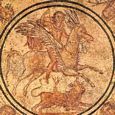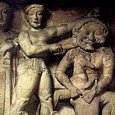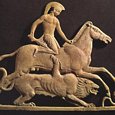PEGASOS
Greek Name
Πηγασος
Transliteration
Pêgasos
Latin Spelling
Pegasus
Translation
Of the Spring (pêgê)
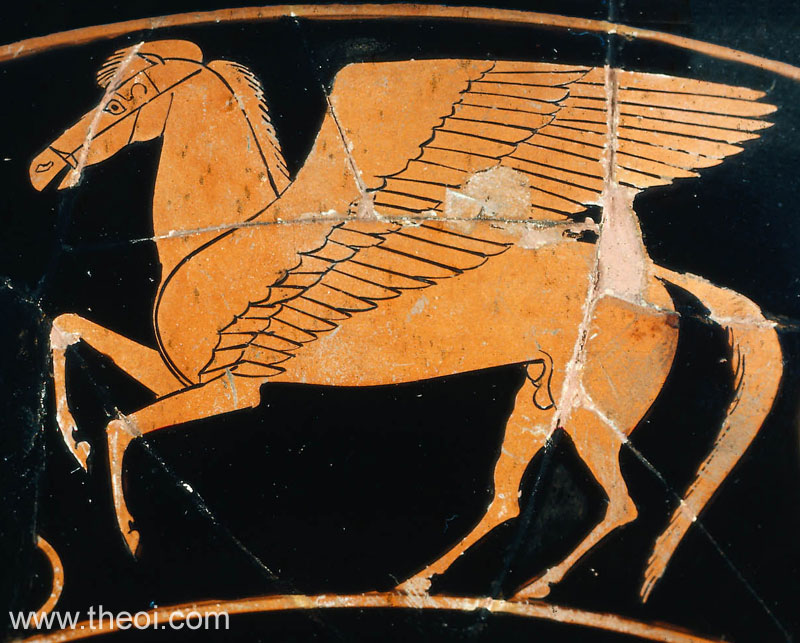
PEGASOS (Pegasus) was an immortal, winged horse which sprang from the neck of the beheaded Gorgon Medousa (Medusa). It was tamed by Bellerophon who rode it into battle against the fire-breathing monster known as the Khimaira (Chimera). Later the hero attempted to fly to heaven but Zeus caused the horse to buck throwing him back down to earth in disgrace. Pegasos winged his way on to Olympos where he became the thunderbolt-bearer of Zeus.
Pegasos was commemorated amongst the stars as the constellation of the same name. Its rising marks the arrival of spring and, in Greece, of seasonal thunderstorms.
Pegasos' name means either "of the spring" from the Greek word pêgê, or "sprung forth" from the word pêgazô. The first alludes to the steed's connection with various springs, and the latter to its birth from the Gorgon's neck.
FAMILY OF PEGASUS
PARENTS
[1.1] POSEIDON & MEDOUSA (Hesiod Theogony 278, Apollodorus 2.32
& 2.42, Hyginus Fabulae 151 & Astronomica 2.18, Ovid Metamorphoses 4.781 & 6.119)
[1.2] MEDOUSA (Pindar Olympian Ode, Nonnus
Dionysiaca 24.270)
ENCYCLOPEDIA
PE′GASUS (Pêgasos). The famous winged horse, whose origin is thus related. When Perseus struck off the head of Medusa, with whom Poseidon had had intercourse in the form of a horse or a bird, there sprang forth from her Chrysaor and the horse Pegasus. The latter obtained the name Pegasus because he was believed to have made his appearance near the sources (pêgai) of Oceanus. Pegasus rose up to the seats of the immortals, and afterwards lived in the palace of Zeus, for whom he carried thunder and lightning (IIes. Theog. 281, &c.; Apollod. ii. 3. § 2, 4. § 2 ; Schol. ad Aristoph. Pac. 722; comp. Ov. Met. iv. 781, &c. vi. 119). According to this view, which is apparently the most ancient, Pegasus was the thundering horse of Zeus; but later writers describe him as the horse of Eos (Schol. ad Hom. Il. vi. 155; Tzetz. ad Lyc. 17), and place him among the stars as the heavenly horse (Arat. Phaen. 205, &c.; Hygin. Poet. Astr. ii. 18 Ov. Fast. iii. 457, &c.).
Pegasus also acts a prominent part in the fight of Bellerophon against the Chimaera (Hes. Theog. 325; Apollod. ii. 3. § 2). After Bellerophon had tried and suffered much to obtain possession of Pegasus for his fight against the Chimaera, he consuited the soothsayer Polyidus at Corinth. The latter advised him to spend a night in the temple of Athena, and, as Bellerophon was sleeping, the goddess appeared to him in a dream, commanding him to sacrifice to Poseidon, and gave him a golden bridle. When he awoke he found the bridle, offered the sacrifice, and caught Pegasus, who was drinking at the well Peirene (Pind. Ol. xiii. 90, &c. with the Schol.; Strab. viii. p. 379). According to some Athena herself tamed and bridled Pegasus, and surrendered him to Bellerophon (Paus. ii. 4. § 1), or Bellerophon received Pegasus from his own father Poseidon (Schol. ad Hom. Il. vi. 155). After he had conquered the Chimaera (Pindar says that he also conquered the Amazons and the Solymi, Ol. xiii. 125), he endeavoured to rise up to heaven with his winged horse, but fell down upon the earth, either from fear or from giddiness, or being thrown off by Pegasus, who was rendered furious by a gad-fly which Zeus had sent. But Pegasus continued his flight (Hygin. Poet. Astr. ii. 18 ; Pind. Isthm. vii. 6; Tzetz. ad Lyc. 17; Eustath. ad Hom. p. 636). Whether Hesiod considered Pegasus as a winged horse, cannot be inferred with certainty from the word apoptamenose; but Pindar, Euripides, and the other later writers, expressly mention his wings.
Pegasus lastly was also regarded as the horse of the Muses, and in this capacity he is more celebrated in modern times than he ever was in antiquity ; for with the ancients he had no connection with the Muses, except that by his hoof he called forth the inspiring well Hippocrene. The story about this well runs as follows. When the nine Muses engaged in a contest with the nine daughters of Pierus on Mount Helicon, all became darkness when the daughters of Pierus began to sing ; whereas during the song of the Muses, heaven, the sea, and all the rivers stood still to listen, and Helicon rose heavenward with delight, until Pegasus, on the advice of Poseidon, stopped its rising by kicking it with his hoof (Anton. Lib. 9); and from this kick there arose Hippocrene, the inspiring well of the Muses, on Mount Helicon, which, for this reason, Persius (Prol. 1) calls fons caballinus (Ov. Met. v. 256). Others again relate that Pegasus caused the well to gush forth because he was thirsty; and in other parts of Greece also similar wells were believed to have been called forth by Pegasus, such as Hippocrene, at Troezene, and Peirene, near Corinth (Paus. ii. 31. § 12; Stat. Theb iv. 60). Pegasus is often seen represented in ancient works of art and on coins along with Athena and Bellerophon.
Source: Dictionary of Greek and Roman Biography and Mythology.
CLASSICAL LITERATURE QUOTES
THE BIRTH OF PEGASUS
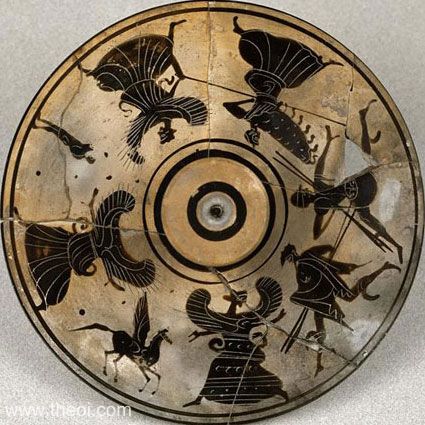
Hesiod, Theogony 280 ff (trans. Evelyn-White) (Greek epic C8th or C7th B.C.)
:
"But when Perseus had cut off the head of Medousa (Medusa) there sprang from her blood stout-hearted
Khrysaor (Chrysaor) and the horse Pegasos so named from the springs (pegai) of Okeanos (Oceanus), where
he was born."
Pseudo-Apollodorus, Bibliotheca 2. 42 (trans. Aldrich) (Greek mythographer C2nd A.D.)
:
"When he [Perseus] saw Medousa (Medusa), he beheaded her. As soon as her head was severed there leaped from
her body the winged horse Pegasos and Khrysaor (Chrysaor), the father of Geryon. The father of these two was
Poseidon."
Lycophron, Alexandra 840 ff (trans. Mair) (Greek poet C3rd B.C.) :
"The harvester [Perseus] who delivered of her [Medousa's (Medusa's)] pains in birth of horse [Pegasos] and
man [Khrysaor (Chrysaor)] the stony-eyed weasel whose children sprang from her neck.”
Strabo, Geography 8. 6. 20 (trans. Jones) (Greek geographer C1st B.C. to C1st A.D.)
:
"Pegasos, a winged horse which sprang from the neck of the Gorgon Medousa (Medusa) when her head was cut
off."
Pseudo-Hyginus, Fabulae 151 (trans. Grant) (Roman mythographer C2nd A.D.)
:
"From Medusa, daughter of Gorgon, and Neptunus [Poseidon], were born Chrysaor and horse Pegasus."
Ovid, Metamorphoses 4. 786 ff (trans. Melville) (Roman epic C1st B.C. to C1st A.D.)
:
"While deep sleep held fast Medusa and her snakes, he [Perseus] severed her head clean from her neck; and
from their mother's blood swift-flying Pegasus and his brother [Khrysaor (Chrysaor)] sprang . . . she [Medusa],
it's said, was violated in Minerva's [Athena's] shrine by the Lord of the Sea (Rector Pelagi)
[Poseidon]."
Ovid, Metamorphoses 6. 119 ff :
"[Poseidon] as a bird [mated with] the snake-haired mother [Medousa (Medusa)] of the flying steed
[Pegasos]."
Ovid, Fasti 3. 449 ff (trans.Boyle) (Roman poetry C1st B.C. to C1st A.D.)
:
"Men believe it [Pegasos] sprang with its blood-spattered mane from the butchered Medusa's pregnant neck.
As it glided above the clouds and beneath the stars, the sky was its earth and wings were its feet."
Nonnus, Dionysiaca 31. 13 ff (trans. Rouse) (Greek epic C5th A.D.) :
"As Medousa (Medusa) was slain [by Perseus], the neck was delivered of its twin birth, the Horse [Pegasos]
and the Boy with the golden sword [Khrysaor (Chrysaor)]."
Nonnus, Dionysiaca 24. 270 ff :
"[Perseus] shore off the snaky swathe of one Medousa, while her womb was still burdened and swollen with
young, still in foal of Pegasos; what good if the sickle played the part of childbirth Eileithyia, and reaped
the neck of the pregnant Gorgon, firstfruits of a horsebreeding neck?"
PEGASUS & THE SPRING OF HIPPOCRENE
Hippokrene (Hippocrene) was the sacred spring of the Mousai (Muses) on Mount Helikon (Helicon) in Boiotia. It was said to have burst forth from the ground where struck by the hoof of the winged horse Pegasos.
Aratus, Phaenomena 206 ff (trans. Mair) (Greek astronomical poem C3rd B.C.)
:
"The huge [constellation] Horse (Hippos) . . . He [Pegasos] it was, men say, that brought down from lofty
Helikon (Helicon) the bright water of bounteous Hippokrene (Hippocrene). For not yet on Helikon's summit
trickled the fountain's springs, but the Horse smote it and straightway the gushing water was shed abroad at the
stamp of his forefoot, and herdsmen were the first to call that stream the fountain of the Horse. From the rock
the water wells and never shalt thou see it far from the men of Thespiai (Thespiae); but the Horse himself
circles in the heaven of Zeus and is there for thee to behold."
Strabo, Geography 8. 6. 20 (trans. Jones) (Greek geographer C1st B.C. to C1st A.D.)
:
"The same horse [Pegasos], it is said, caused Hippu-krene (Horse Fountain) to spring up on Helikon
(Helicon) when he struck with his hoof the rock that lay below that mountain."
Pausanias, Description of Greece 9. 31. 3 (trans. Jones) (Greek travelogue C2nd A.D.)
:
"Ascending about twenty stades from this grove [of the Mousai (Muses) on Mount Helikon in Boiotia] is what
is called the Hippokrene (Hippocrene, Horse's Fountain). It was made, they say, by [Pegasos] the horse of
Bellerophon striking the ground with this hoof."
Pausanias, Description of Greece 2. 31. 9 :
"Among the means of cleansing [by ritual purification] which they say they [the people of Troizenos
(Troezen), Argolis] used to cleanse Orestes was water from Hippokrene (Horse's Fountain}; for the Troizenians
too have a fountain called the Horse's, and the legend about it does not differ from the one which prevails in
Boiotia (Boeotia). For they, too, say that the earth sent up the water when the horse Pegasos struck the ground
with his hoof, and that Bellerophontes came to Troizenos to ask Pittheus to give him Aithra (Aethra) to
wife."
Antoninus Liberalis, Metamorphoses 9 (trans. Celoria) (Greek mythographer C2nd A.D.)
:
"When the Mousai (Muses) sang, heaven, the stars, the sea and rivers stood still, while Mount Helikon
(Helicon), beguiled by the pleasure of it all, swelled skyward till, by the will of Poseidon, Pegasos checked it
by striking the summit with his hoof."
Callistratus, Descriptions 7 (trans. Fairbanks) (Greek rhetorician C4th A.D.)
:
"On Helikon (Helicon)--the spot is a shaded precinct sacred to the Mousai (Muses)--near the torrent of the
river Olmeios and the violet-dark spring of Pegasos, there stood the [statues of the] Mousai."
Pseudo-Hyginus, Astronomica 2. 18 (trans. Grant) (Roman mythographer C2nd A.D.)
:
"Pegasus, offspring of Neptunus [Poseidon] and the Gorgon Medusa, who on Helicon, a mountain of Boeotia,
opened up a spring by striking the rock with his hoof. From him the spring is called Hippocrene."
Ovid, Fasti 3. 449 ff (trans.Boyle) (Roman poetry C1st B.C. to C1st A.D.)
:
"It [Pegasos] had only just protested its strange bridling [by Bellerophon], when its light hoof dug
Aonia's spring [i.e. the Hippokrene (HIppocrene)]."
Ovid, Metamorphoses 5. 254 ff (trans. Melville) (Roman epic C1st B.C. to C1st A.D.)
:
"Helicon, the Musae's (Muses') mountain home. Alighting there she [Athena] stopped and thus addressed the
learned sisters : ‘there has reached my ears a tale of a new fountain that burst forth beneath the hooves
of flying Medusaeus [Pegasos, child of Medousa (Medusa)]. That is my journey's purpose, my desire to see the
miracle. I saw that horse brought into being from his mother's blood.’
Uranie replied : ‘Whatever cause may bring you to our home, you find our hearts most welcoming. The tale
indeed is true; the author of the spring is Pegasus.’
She led Pallas [Athena] to the sacred spring. The waters issuing from his hoof's hard stroke long held her
wondering eyes; then she gazed round at the green bowers of the ancient woods, the caves and grottoes and the
spangled lawns with all their countless flowers."
Propertius, Elegies 3. 3 (trans. Goold) (Roman elegy C1st B.C.) :
"I dreamed that lying in the soft shade of Helicon, where flows the fountain of Bellerophon's horse
[Pegasos], I possessed the power to proclaim my lyre's accompaniment Alba's kings and their deeds."
Nonnus, Dionysiaca 44. 6 ff (trans. Rouse) (Greek epic C5th A.D.) :
"A fountain [Hippokrene (Hippocrene)] bubbled on the spot where the horse's [Pegasos'] wet hoof scratched
the surface of the ground and made a hollow for the water which took its name from him."
PEGASUS, BELLEROPHON & THE CHIMERA
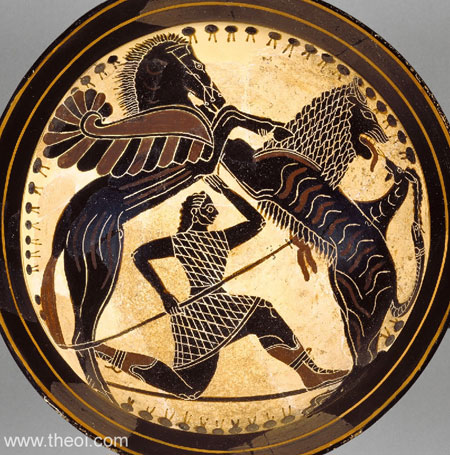
Hesiod, Theogony 325 ff (trans. Evelyn-White) (Greek epic C8th or C7th B.C.)
:
"But Khimaira (Chimera) was killed by Pegasos and gallant Bellerophon."
Hesiod, Catalogues of Women Fragment 7 (trans. Evelyn-White) (Greek epic C8th or C7th
B.C.) :
"And when he [Bellerophon] began to roam, his father [Poseidon] gave him Pegasos who would bear him most
swiftly on his wings, and flew unwearying everywhere over the earth, for like the gales he would course along.
With him Bellerophon caught and slew the fire-breathing Khimaira (Chimera)."
Pindar, Olympian Ode 13. 63 ff (trans. Conway) (Greek lyric C5th B.C.) :
"[Bellerophon] once strove in vain beside Peirene's spring, and suffered much, seeking to yoke the
snake-haired Gorgo's offspring, Pegasos. Till Pallas [Athena], goddess maid, brought him the bridle and golden
headband, and behold a dream was truth. ‘Sleep not, Aiolid king,’ said she, ‘but take this
charm of steeds, and offer the Horse-Tamer [Poseidon], your sire, a snow-white bull, and show to him this
bridle.’
Such words, as he lay slumbering in the dark, it seemed the maiden of the shadowy aegis spoke unto him, and he
leapt to his feet and seized the magic bit, that lay beside him on the ground; and went with joy to find the
prophet of his country's people the son of Korianos (Corianus). And he made known to him the whole issue of this
strange matter--how that he had lain the whole night through upon the goddess' altar, as the seer had foretold
him, and how the child of Zeus whose sword is lightning, in her own hands brought him the golden charm that
tames the savage spirit. And the prophet bade him obey at once the magic vision, and to Poseidon, the
earth-holder, to sacrifice the strong-limbed bull. Then too that he should build an altar with all speed to
Athene, queen of steeds. Yet the gods' power can lightly bring to pass such things as will deny both the sworn
word and all the hopes of men. Thus with all zeal mighty Bellerophon seized the winged steed, setting between
his jaws the soothing charm, and mounting him, in his bronze panoply played him in sport, to try his pace. And
once, with him, he smote the Amazones (Amazons), from the chill bosom of the lonely air, that archered host of
women-kind; and felled Khimaira (Chimera) breathing fire, and slew the Solymoi (Solymi). His fate--'twere best
unspoken. But Pegasos dwells in the ancient stalls of Zeus upon Olympos."
Pindar, Isthmian Ode 7. 44 ff :
"Pegasos winged high threw down to earth his lord Bellerophon, who thought to reach the abodes of heaven,
and share the company of Zeus. Sweets gained unrightly await an end most bitter."
Pseudo-Apollodorus, Bibliotheca 2. 32 (trans. Aldrich) (Greek mythographer C2nd A.D.)
:
"Bellerophon mounted Pegasos, his winged horse born of Medousa (Medusa) and Poseidon, and flying into the
air brought down the Khimaira (Chimera) with his bow and arrows."
Strabo, Geography 8. 6. 20 (trans. Jones) (Greek geographer C1st B.C. to C1st A.D.)
:
"Peirene [a spring of the city of Korinthos (Corinth)] was wont to rise over the surface and flow down the
sides of the mountain. And here, they say, Pegasos, a winged horse which sprang from the neck of the Gorgon
Medousa (Medusa) when her head was cut off, was caught while drinking by Bellerophon. And the same horse, it is
said, caused Hippu-krene (Horse Fountain) to spring up on Helikon when he struck with his hoof the rock that lay
below that mountain."
Pausanias, Description of Greece 2. 1. 9 (trans. Jones) (Greek travelogue C2nd A.D.)
:
"[In the temple of Poseidon on the Isthmos of Korinthos (Corinth) :] Among the reliefs on the base of the
statue of Poseidon are the sons of Tyndareus, because these too are saviours of ships and of sea-faring men. The
other offerings are images of Calm and of Sea, a horse like a whale from the breast onward, Ino and
Bellerophontes, and the horse Pegasos."
Pausanias, Description of Greece 2. 3. 5 :
"The Korinthians (Corinthians) have baths in many parts of the city . . . The most famous of them is near
the Poseidon. It was made by the Spartan Eurykles (Eurycles), who beautified it with various kinds of stone,
especially the one quarried at Krokeai (Croceae) in Lakonia. On the left of the entrance stands a Poseidon, and
after him Artemis hunting. Throughout the city are many wells, for the Korinthians have a copious supply of
flowing water . . . but the most noteworthy is the one by the side of the image of Artemis. Over it is a
Bellerophontes, and the water flows through the hoof of the horse Pegasos."
Pausanias, Description of Greece 2. 4. 1 :
"Athena, they say. Was the divinity who gave most help to Bellerophontes, and she delivered to him Pegasos,
having herself broken in and bridled him."
Pausanias, Description of Greece 2. 31. 9 :
"They [the people of Troizenos (Troezen) in Argolis], too, say that the earth sent up the water when the
horse Pegasos struck the ground with his hoof, and that Bellerophontes came to Troizen to ask Pittheus to give
him Aithra (Aethra) to wife."
Pseudo-Hyginus, Fabulae 57 (trans. Grant) (Roman mythographer C2nd A.D.) :
"Iobates [king of Lykia (Lycia)] was reluctant to kill the hero [Bellerophon], but sent him to kill the
Chimaera, a three-formed creature said to breathe forth fire. Likewise : forepart lion, rearpart snake, middle
she-goat. This he slew, riding on Pegasus, and he is said to have fallen in the Aleian plains and to have
dislocated his hip."
Pseudo-Hyginus, Astronomica 2. 18 :
"[Proitos (Proetus)] knowing that he [Bellerophon] had the horse Pegasus, sent him to the father of
Antia--some call her Sthenoboea--, for him to defend his daughter's chastity and send the youth against the
Chimera, which at that time was laying waste with flames the country of the Lycians.
Bellerophon was victor, and escaped, but after the creation of the spring, as he was attempting to fly to
heaven, and had almost reached it, he became terrified looking down at the earth, and fell off and was killed.
But the horse is said to have flown up and to have been put among the constellations by Jove [Zeus]."
Ovid, Fasti 3. 449 ff (trans.Boyle) (Roman poetry C1st B.C. to C1st A.D.)
:
"[Pegasus] had only just protested its strange bridling [by Bellerophon], when its light hoof dug Aonia's
spring [the Hippokrene (Hippocrene)]."
Apuleius, The Golden Ass 8. 16 ff (trans. Walsh) (Roman novel C2nd A.D.) :
"I reflected that it was panic more than anything which had induced the celebrated Pegasus to take to the
air, and that the tradition that he had wings was justified because he leapt upward as high as heaven in his
fear of being bitten by the fire-breathing Chimaera."
Oppian, Cynegetica 1. 225 ff (trans. Mair) (Greek poet C3rd A.D.) :
"To Horses beyond all mortal creatures cunning Nature has given a subtle mind and heart . . . A horse
[Pegasos] carried above the clouds him [Bellerophon] that slew the Khimaira (Chimera)."
Nonnus, Dionysiaca 11. 142 ff (trans. Rouse) (Greek epic C5th A.D.) :
"Quickwing Pegasos threw Bellerophontes and sent him headlong down from the sky, although he was of the
seed of Earthshaker [Poseidon] and the horse himself shared the kindred blood of Poseidon."
Nonnus, Dionysiaca 28. 167 ff :
"Pegasos flying high in the air as swift in his course as the wandering wind, threw Bellerophontes."
THE CONSTELLATOIN PEGASUS
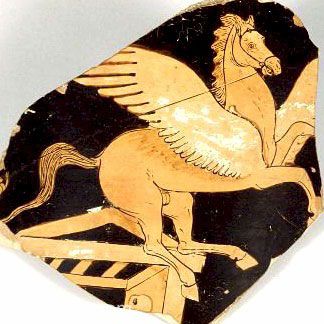
Hesiod, Theogony 280 ff (trans. Evelyn-White) (Greek epic C8th or C7th B.C.)
:
"Pegasos, soaring, left the earth, the mother of sheep flocks, and came to the immortals, and there he
lives in the household of Zeus, and carries the thunder and lightning for Zeus of the counsels."
Pindar, Olympian Ode 13. 92 ff (trans. Conway) (Greek lyric C5th B.C.) :
"Pegasos dwells in the ancient stalls of Zeus upon Olympos."
Plato, Phaedrus 246 (trans. Lamb) (Greek philosopher C4th B.C.) :
"A pair of winged horses and a charioteer. Now the winged horses and the charioteers of the gods are all of
them noble and of noble descent . . . Zeus, the mighty lord, holding the reins of a winged chariot, leads the
way in heaven, ordering all and taking care of all; and there follows him the array of gods and demigods,
marshalled in eleven bands [the twelve Olympians]."
Aratus, Phaenomena 206 ff (trans. Mair) (Greek astronomical poem C3rd B.C.)
:
"The huge [constellation] Horse (Hippos) [is Pegasos] . . . the Horse himself circles in the heaven of Zeus
and is there for thee to behold."
Pseudo-Hyginus, Astronomica 2. 18 (trans. Grant) (Roman mythographer C2nd A.D.)
:
"Constellation Horse. This sign Aratus and many others have called Pegasus, offspring of Neptunus
[Poseidon] and the Gorgon Medusa . . . As he [Bellerophon] was attempting to fly to heaven, and had almost
reached it, he became terrified looking down at the earth, and fell off and was killed. But the horse [Pegasos]
is said to have flown up and to have been put among the constellations by Jove [Zeus]."
Ovid, Fasti 3. 449 ff (trans.Boyle) (Roman poetry C1st B.C. to C1st A.D.)
:
"Now when stars spangle the deep blue heavens, look up: you'll see the neck of the Gorgonian horse [the
constellation Pegasos]. Men believe it sprang with its blood-spattered mane from the butchered Medusa's pregnant
neck. As it glided above the clouds and beneath the stars, the sky was its earth and wings were its feet. It had
only just protested its strange bridling [by Bellerophon], when its light hoof dug Aonia's spring [the
Hippokrene (Hippocrene)]. Now it enjoys the sky, which it wings sought before, and gleams resplendent with five
stars and ten."
Nonnus, Dionysiaca 37. 265 ff (trans. Rouse) (Greek epic C5th A.D.) :
"Pegasos flying on high quickly cut the air on his long wings."
THE PEGASI HORSES
Pegasoi or winged horses (hippoi pteretoi) were often depicted in ancient art drawing the chariots of the gods, especially those of the sun-god Helios and moon-goddes Selene. In myth the hero Pelops was given a chariot drawn by winged horses by the god Poseidon. A species of winged horse is also described in Greek legend--animals believed to be indigenous to the mysterious land of Aithiopia (Ethiopia)--see Pegasoi Aithiopikoi.
Plato, Critias (trans. Lamb) (Greek philosopher C4th B.C.) :
"[In the temple of Poseidon on the mythical island of Atlantis :] Here was the [statue of the] god himself
standing in a chariot--the charioteer of six winged horses [Pegasoi]."
Pausanias, Description of Greece 5. 17. 7 (trans. Jones) (Greek travelogue C2nd A.D.)
:
"[Amongst the scenes depicted on the chest of Kypselos (Cypselus) dedicated at Olympia :] Oinomaos
(Oenomaus) is chasing Pelops, who is holding Hippodameia. Each of them has two horses, but those of Pelops have
wings."
Pausanias, Description of Greece 5. 19. 8 :
"[Amongst the scenes depicted on the chest of Kypselos dedicated at Olympia :] Next come two-horse chariots
with women standing in them. The horses have golden wings, and a man is giving armour to one of the women. I
conjecture that this scene refers to the death of Patroklos (Patroclus); the women in the chariots, I take it,
are Nereides, and Thetis is receiving the armour from Hephaistos (Hephaestus)."
ANCIENT GREEK & ROMAN ART
SOURCES
GREEK
- Hesiod, Theogony - Greek Epic C8th - 7th B.C.
- Hesiod, Catalogues of Women Fragments - Greek Epic C8th - 7th B.C.
- Pindar, Odes - Greek Lyric C5th B.C.
- Plato, Critias - Greek Philosophy C4th B.C.
- Plato, Phaedrus - Greek Philosophy C4th B.C.
- Apollodorus, The Library - Greek Mythography C2nd A.D.
- Lycophron, Alexandra - Greek Poetry C3rd B.C.
- Aratus, Phaenomena - Greek Astronomy C3rd B.C.
- Strabo, Geography - Greek Geography C1st B.C. - C1st A.D.
- Pausanias, Description of Greece - Greek Travelogue C2nd A.D.
- Antoninus Liberalis, Metamorphoses - Greek Mythography C2nd A.D.
- Callistratus, Descriptions - Greek Rhetoric C4th A.D.
- Oppian, Cynegetica - Greek Poetry C3rd A.D.
- Nonnus, Dionysiaca - Greek Epic C5th A.D.
ROMAN
- Hyginus, Fabulae - Latin Mythography C2nd A.D.
- Hyginus, Astronomica - Latin Mythography C2nd A.D.
- Ovid, Metamorphoses - Latin Epic C1st B.C. - C1st A.D.
- Ovid, Fasti - Latin Poetry C1st B.C. - C1st A.D.
- Propertius, Elegies - Latin Elegy C1st B.C.
- Apuleius, The Golden Ass - Latin Novel C2nd A.D.
BIBLIOGRAPHY
A complete bibliography of the translations quoted on this page.
